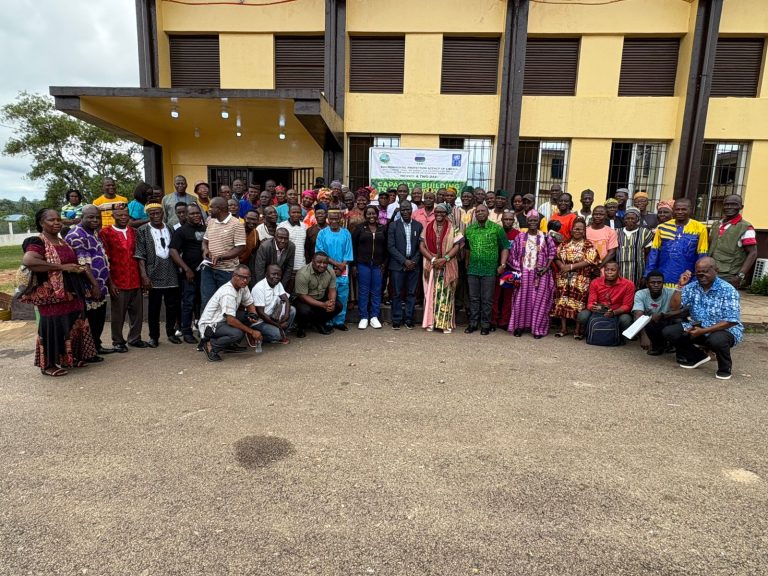Posts Categories
Latest Posts

Gbarnga, Bong County – June 6, 2025 – The Environmental Protection Agency of Liberia (EPA), with support from the Energy and Environment Project through the United Nations Development Programme (UNDP), has kicked off a two-day capacity building workshop for members of the County Environment Committees from Bong and Gbarpolu Counties.
The training, held under the theme “Environment Protection Management: Taking Environmental Governance to the People”, began on Friday, June 6, and will end on Saturday, June 7, 2025, in Gbarnga, Bong County.
The goal of the workshop is to strengthen the ability of county-level environmental teams to address local environmental issues. It is part of the EPA’s ongoing decentralization process aimed at taking environmental governance closer to communities and improving responses to challenges like pollution, illegal mining, and climate change.
The EPA was created in 2002 to serve as the lead government institution for environmental protection and the sustainable use of natural resources. Sections 24 to 27 of the EPA Act call for the creation of County Environment Committees to help enforce environmental laws and raise awareness at the community level.
The decentralization process began in 2024 as part of the EPA’s 100-day deliverables. Offices were established in Grand Cape Mount, Gbarpolu, Montserrado, and Rivercess Counties. This year, two more EPA offices will open in Grand Kru and River Gee Counties.
Speaking at the opening of the workshop, EPA Executive Director Dr. Emmanuel Urey Yarkpawolo said solving Liberia’s environmental problems is not a one-man job. “Environmental issues are the concern of every Liberian. We must all take ownership,” he stated.
Dr. Yarkpawolo blamed many environmental problems on human activities such as illegal mining, which he said is polluting rivers and destroying land. “What we are seeing today is not just a national problem, it is a global issue. This is what we call climate change,” he noted.
He said the training is part of EPA’s larger goal of building the capacity of county and local teams so that problems can be addressed faster and more effectively. “The EPA is decentralizing because we want environmental governance to be visible at the grassroots. That way, when something happens, people on the ground can respond quickly,” he said.
Dr. Yarkpawolo encouraged County Environment Committee members to take their roles seriously and work with community leaders, lawmakers, and civil society to protect Liberia’s environment. “This training is just the beginning. We hope you will return to your counties and apply what you learn for the benefit of your people,” he added.
Bong County Superintendent Madam Hawa Loleyah Norris welcomed the delegates and expressed her administration’s full support for the EPA. She said her office has been working with the EPA’s local team to address environmental issues in the county. “We take environmental matters seriously in Bong. Our doors are always open for collaboration,” she said.
Gbarpolu County Senator Botoe Kanneh also joined the workshop and praised the EPA for organizing the training. She called attention to the growing issue of illegal mining in Gbarpolu and appealed to the EPA and its partners to give the county more support. “Too many rivers are being destroyed by illegal mining. We need help to stop this,” she stated. She also assured that the Gbarpolu Legislative Caucus is ready to work with the EPA.
Ms. Josephine Mongor, Finance and Administrative Associate at UNDP, spoke on behalf of the agency and praised the EPA’s decentralization efforts. “This is not just a reform—it is a bold commitment to include everyone in protecting our environment,” she said.
She mentioned that with UNDP support, the EPA has already set up offices in four counties and is now expanding further. “We are proud to be part of this journey,” she said. Mongor also highlighted that the participation of women, youth, traditional leaders, and local authorities in the training is a positive sign of inclusive governance.
“Environmental problems affect all of us, and the best way to fight them is to work together,” she said, adding that UNDP will continue to stand by the EPA as the decentralization process moves forward.
The EPA says that by decentralizing its operations, it hopes to improve the monitoring and enforcement of environmental rules, respond faster to emergencies, and increase public awareness about environmental protection. The establishment of the County Environment Committees is a key step in that direction.
The EPA added that as an institution, it is committed to ensuring that every Liberian county is equipped to protect its natural resources and promote a cleaner and safer environment.
-30-
